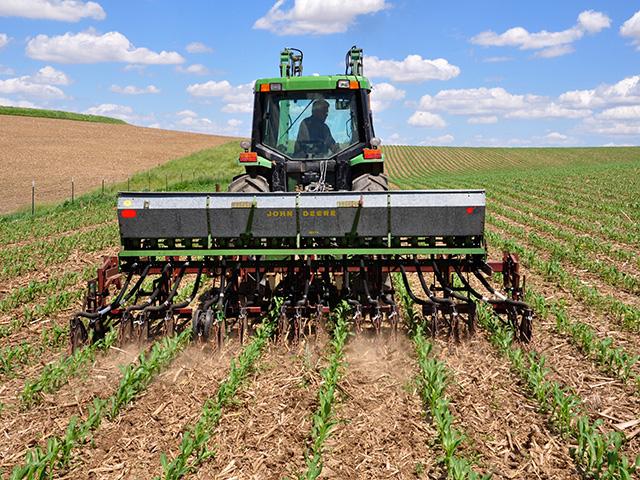AFT Details 2023 Farm Bill Priorities
American Farmland Trust Champions Greater Conservation Ties to Crop Insurance
OMAHA (DTN) -- While some agricultural groups have repeatedly stressed opposition to linking crop insurance premium incentives to conservation or climate change, the American Farmland Trust called on Congress to increase the "synergies" between crop insurance and conservation in the next farm bill.
American Farmland Trust (AFT) on Tuesday released the group's recommendations for the next farm bill, focusing on expanding access to conservation programs as well as programs that preserve farm ground from development through easements.
Farm groups and Congress are gearing up for a farm bill debate, with the current legislation set to expire at the end of September 2023. Still, farm bills are often extended -- sometimes multiple years -- because Congress and the White House are unable to agree on priorities. Chances are high that scenario will play out next year as well.
AGRICULTURAL EASEMENTS
Most farm groups have declared that protecting the crop insurance program is their top priority. AFT's top priority going into farm bill talks is to increase funding for the Agricultural Conservation Easement Program (ACEP), including ACEP's Agricultural Land Easements (ALE) component.
AFT noted about 11 million acres of farm ground were lost to development from 2001-2016, and another 18 million could be lost by 2040. John Piotti, president of AFT, said farmland is better for emissions than development.
"Farmland that is protected produces very few emissions, while the development that would otherwise ensue produces a lot of emissions, he said.
Piotti added that losing farm ground puts more pressure on remaining land in agriculture as well. Also, farmland sequestering carbon essentially loses it all when it is dug up and converted to housing and asphalt.
"If we're going to get serious about carbon markets, we're going to have to think about carbon and land protection as a package," he said.
ACEP is authorized at $450 million a year, but congressional appropriators have limited the program to $119 million, $118 million and $105 million annually over the past three years.
P[L1] D[0x0] M[300x250] OOP[F] ADUNIT[] T[]
AFT also wants to increase the federal cost share to cover more costs for participation in ACEP as well. Other tweaks are needed in ACEP to help with certification of land-trust programs, including modifying language to better help young and historically marginalized producers to buy protected farmland.
CROP INSURANCE
Citing that "crop insurance is all about managing risk," AFT wants to see more efforts in the crop insurance program to reward farmers for using certain conservation practices. That includes essentially codifying the USDA Pandemic Cover Crop Program (PCCP) that provides farmers a lower premium for using cover crops.
Crop insurance should also recognize practices tied to USDA conservation practices, such as those in the Conservation Stewardship Program (CSP), AFT said.
The farm bill should, "Make sure farmers are never forced to choose between crop insurance and conservation," said Emily Liss, who works on federal policy for AFT.
Sheryl Hagen-Zakarison, a farmer from the Pullman, Washington, area, talked Tuesday about how her farm's efforts to become more resilient, such as going to no-till and diversifying her crop mix, directly conflict with crop insurance policies. In 2019, she was told she could not get crop insurance on her winter wheat crop because she had interseeded winter lentils into the crop.
"Basically, the insurance agent said we cannot insure your crop because you intercropped," Hagen-Zakarison said, noting that intercropping was part of her CSP contract. "We really haven't been able to have a conversation with our crop insurance agent to be able to participate."
Hagen-Zakarison said she has had similar problems trying to get crop insurance on crops such as winter triticale or peas that are not typically farmed in her area.
"It seems like you are being really, really discouraged and being somewhat penalized for being innovative and doing the right thing as far as conservation goes," Hagen-Zakarison said.
Commodity groups and those who represent crop insurance companies have told lawmakers in hearings to not tie crop insurance to climate-smart conservation practices. Instead, they want to keep conservation and crop insurance as separate titles in the farm bill.
See "Crop Insurance Industry, Lawmakers Declare 'Do No Harm' to Program" here: https://www.dtnpf.com/….
EXPAND CONSERVATION
While no surprise, AFT also has a long list of proposals to increase funding for conservation programs and expand technical assistance to producers as well. That includes supporting the expansion and adoption of climate-smart practices nationally.
For the Environmental Quality Incentives Program (EQIP), right now, only about 30% of all applicants are funded in any given year. AFT wants to see more expansion overall there, especially for practices that improve soil health and reduce emissions.
AFT also stressed the need for greater access to conservation programs, and USDA programs overall, for historically marginalized producers.
HELPING SMALLER FARMERS
Moses Momanyi, a Kenyan native who runs Dusk2Dawn Farms in Minnesota, is an immigrant in the Twin Cities area who has, over time, helped mentor other minority farmers and combed the region for tracts of land to expand small fruit and vegetable farms. Citing a lack of credit, he said there are a lot of hurdles for people to try to get into farming.
"We saw land access being the biggest barrier to immigrants like us getting on the land," Momanyi said.
AFT is calling on Congress to create an office at USDA specifically to help small-scale farmers access USDA programs such as EQIP, CSP and crop insurance policies. Tied to that, AFT also wants to expand individualized business technical assistance (BTA) at USDA to support small and beginning farmers and ranchers, especially to help secure land and promote farm transfers.
AFT's Farm Bill Recommendations: https://farmland.org/…
Chris Clayton can be reached at Chris.Clayton@dtn.com
Follow him on Twitter @ChrisClaytonDTN
(c) Copyright 2022 DTN, LLC. All rights reserved.



